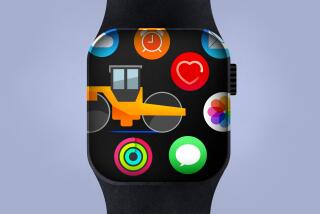Next Inc. to Shift Strategy, Pursue Corporate Clients
- Share via
Five months ago, when computer marketing whiz Steven Jobs unveiled a hot new computer that did calculus and played Bach, Jobs said it would be sold exclusively to college students. Now that strategy has abruptly changed.
According to industry sources, Jobs, the brash young founder and former chairman of Apple Computer, will begin selling his sleek Next Inc. computers to corporations as well, through Businessland retail outlets later this year.
Sources said Jobs moved up his plans for broad distribution to businesses to keep pace with competitors who are introducing rival systems for the lucrative corporate marketplace.
Analysts said Next’s deal with the 112-outlet Businessland, which leaked out before a formal announcement scheduled for next Thursday, would give Jobs’ Palo Alto company greater visibility, speed up development of software for its workstations and deal a blow to rival Sun Microsystems Inc., which is expected to unveil a high-powered computer for the general business market next month.
Never Excluded Business
The deal is also a boon for Businessland, which last month lost its sales agreement with Compaq Computer, whose fast-selling machines have accounted for about 15% of its annual sales. Businessland officials could not be reached for comment on the Next deal.
Although Jobs repeatedly insisted last October that he wanted to sell his $6,500 “scholar’s workstation” only to educators and students for at least several years, analysts and sources close to the company said Thursday that he never meant to preclude the business market.
“From the beginning this was always seen as a business machine,” said one company insider. “The question has just been in the timing.”
Exclusivity for the university market “was always a smoke screen,” added Bruce Lupatkin, an analyst for Hambrecht & Quist Inc. in San Francisco. “Anybody who is awake would realize you couldn’t build a big business in workstations and avoid selling to the corporate and technical market.”
In fact, another insider said the company for months has stockpiled T-shirts proclaiming the Next machine, Jobs’ first product since his ouster as chairman of Apple in 1985, as “the Next best” for engineering and other corporate uses.
Big Price Tag
However, university sources said that despite the deal with Businessland, Next has promised that it will not abandon the higher education market. They said Jobs still hopes that the campus community will continue with the original strategy of developing software programs and applications for the system.
One analyst speculated that Next may be moving to a broader market after discovering that its product is simply too expensive for the educational market. Analysts estimated that the Next system would carry a retail price tag between $11,000 and $12,000.
The worldwide market for general-purpose and technical workstations--high-powered desktop computers--was $4.3 million in 1988 and is among the fastest-growing segments of the computer industry, according to Dataquest, a San Jose market research company.
Analysts were divided over whether the Next move is a smart one. Jonathan Seybold, a Malibu market analyst, said he believes Next will be a success in the business market. However, the switch may backfire on Next, said Stewart Alsop, publisher of the PC Letter. “You can’t run around for three years saying one thing and then change it overnight,” he said. Further, Alsop argued that the Next system is not designed for business use and is not compatible with existing standard products.
Analysts and company insiders said Jobs’ decision to move into the business market at this time was dictated by several factors, including the remarkable popularity of the machine among educators. According to one source, Next shipped 2,400 systems from December through February, the first three months the machines were available. At that rate of growth, the analyst estimated that Next would ship as many as 20,000 systems by the end of 1989.
Jockeying for Position
“The group at Next is hungry and ambitious,” said one insider. “They’ve figured out that there is more interest here than they originally thought. They just want to show the world.”
Another key reason for the timing of the announcement, said another insider, is the scheduled introduction next month of a new general-purpose business workstation by Sun Microsystems, a machine that would compete directly with Next’s system for the business buyer.
Next officials declined to comment on the Businessland deal. However, in an invitation to a “major business announcement” next week, Jobs wrote: “Every workstation manufacturer is jockeying for market position. Next believes that several non-technical factors will play key roles in determining who wins.”
Another reason for joining Businessland, said an insider, was the realization that the retailer gives them a much needed national arm to service the computers they sell, whether to business or the higher education market.
According to one analyst, the deal with Businessland gives the retailer the exclusive right to sell to the business market, a distribution deal that other, more established computer manufacturers were unable or unwilling to make.
In addition to the Businessland deal, sources said Next would announce development of spread sheets, word processors and database programs by Lotus Development Corp., Ashton-Tate Co. and Apple’s Claris Corp.





